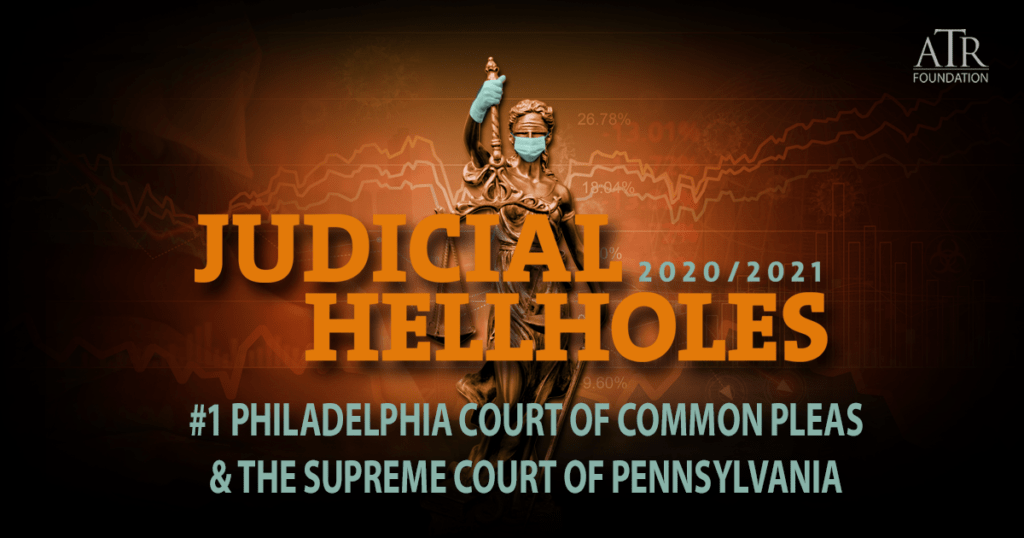‘Highly Unusual’ Rehearing of Louisiana Case Raises Judicial Independence Concerns
Louisiana Supreme Court Waffles Under Political Pressure, ATRA Brief Urges Court to Stand Strong

Philly Court of Common Pleas, PA Supreme Court allow out-of-state lawsuits while Gov. Wolf vetoes liability protections
Pennsylvania courts top the list of “Judicial Hellholes” for the second year running.
The American Tort Reform Foundation (ATRF) named the Philadelphia Court of Common Pleas to the No. 1 spot again, this time joined by the Supreme Court of Pennsylvania. Judicial Hellholes are deemed the most unjust local courts and state civil justice systems in the country. The 2020 report ranks nine Judicial Hellholes while shining a light on lawsuit abuse and its effects.
“Judicial Hellholes like Philadelphia swing open the door for trial lawyers to sue for more money over more issues,” American Tort Reform Association (ATRA) President Tiger Joyce said.
Just last week, Gov. Tom Wolf, D, vetoed H.B. 1737, which included much-needed COVID-19 liability protections for schools, businesses, manufacturers of personal protective equipment, and healthcare workers, among other areas.
“While disappointing, Gov. Wolf’s veto on liability protections is on par with his state’s reputation as a Judicial Hellhole,” Joyce said. “Unfortunately, this veto just means Pennsylvania’s courts will be further burdened and those unlucky enough to have to defend themselves in these courts will experience an out-of-balance civil justice system.”
People across the country who want to file lawsuits flock to Philadelphia’s Court of Common Pleas due to its friendliness toward out-of-state plaintiffs and reputation for excessive verdicts in mass tort lawsuits.
The Supreme Court of Pennsylvania made the state even more appealing for venue shopping by defying U.S. Supreme Court precedent with regard to jurisdiction and with rulings that solidified the state’s low standard for scientific evidence.
Judges’ liberal interpretation of the state’s venue rule contributes to the Philadelphia Court of Common Pleas’ openness to accept out-of-state lawsuits. Pennsylvania courts are dragging their feet in applying the U.S. Supreme Court’s 2017 ruling in the Bristol-Myers Squibb case which said state courts should dismiss cases that aren’t connected to their state.
In October, the Supreme Court of Pennsylvania openly defied U.S. Supreme Court precedent by allowing an Indiana resident to continue their case against a New Jersey-based company in Hammons v. Ethicon.
Further contributing to the Philadelphia Court of Common Pleas’s Judicial Hellhole ranking is Judge Kenneth Powell’s overseeing of mass tort litigation in the court’s Complex Litigation Center against Johnson & Johnson (J&J) subsidiary Ethicon concerning pelvic mesh. It came out that his mother also is suing J&J over injuries caused by another product. Ethicon asked that Judge Powell recuse himself from the case, but he refused. When Ethicon asked the Supreme Court of Pennsylvania to remove Judge Powell from the case, they too refused.
The latest data shows more than 90 cases against Ethicon in Philadelphia and there have been eight verdicts totalling $346 million in damages. Judge Powell also oversaw the Risperdal lawsuit, during which he was also repeatedly accused of biased behavior, which ultimately resulted in an $8 billion verdict last year. He later decreased the award to $6.8 million early this year.
“It is very concerning to observe this pattern of judicial rulings in a court that considers such a large quantity of mass tort litigation,” Joyce said.
Pennsylvania is also one of the last remaining states to use the Frye standard when evaluating expert evidence as opposed to the more widely accepted Daubert standard. The Supreme Court of Pennsylvania had an opportunity in Walsh v. BASF Corp., to make it clear that trial court judges are supposed to ensure expert testimony is based in science.
“It is a judge’s responsibility to ensure unsupported theories and junk science aren’t presented in court as generally accepted scientific or technical principles before a jury,” Joyce said. “Unfortunately, Pennsylvania’s Supreme Court allowed just that to happen and in doing so, made it even more difficult for judges across their state to weed out such junk science from their courtrooms.”
Philadelphia also is a magnet for lawsuits claiming injuries from exposure to asbestos and is in the Top 4 most popular jurisdictions to file these lawsuits. Overall, U.S. asbestos lawsuit filings went down 13% in the first half of the year, but in Philadelphia, increased nearly 12%.
Trial lawyers also use advertisements to drive up the number of claimants and increase the pressure on defendants to settle. In one half of last year, trial lawyers in Philadelphia spent nearly $11 million on 73,000 local TV ads to solicit more clients.
“Lawsuit abuse harms hard-working Pennsylvanians by clogging the court system with meritless and frivolous cases,” Joyce said. “Dollars spent fighting lawsuits are dollars taken away from researching and developing life-saving drugs so desperately needed right now.”
The full 2020-2021 Judicial Hellholes rankings are:
View the full report at JudicialHellholes.org.
Louisiana Supreme Court Waffles Under Political Pressure, ATRA Brief Urges Court to Stand Strong
Left unchecked, these jurisdictions will continue dragging down economic growth and undermining justice through rampant lawsuit abuse.
Claimants Given Opportunity to Vote on Plan; Judge to Reconsider Scientific Validity of Plaintiffs’ Experts
Legitimate consumer protection demands sound science and impartial analysis — not distorted data designed to manufacture lawsuits.
Law Firms Spent $168M+ on 2.2M Ads in Georgia
ATRA’s Latest Studies Reveal Financial Influence and Lack of Transparency in Pennsylvania’s Campaign Finance Systems